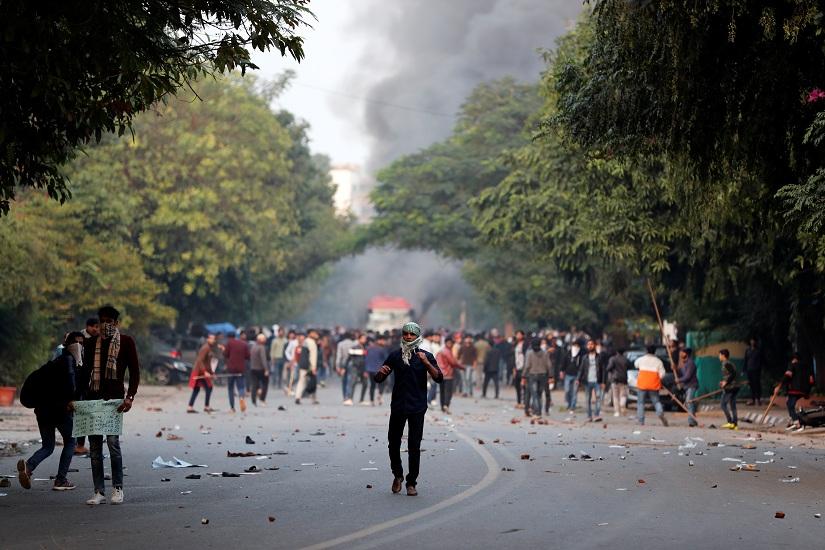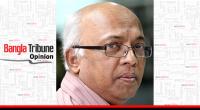 The Indian President Ram Nath Kovind has approved a contentious Citizenship (Amendment) Law that the government says offers a home for people fleeing religious persecution but which opponents say undermines the country's secular identity. The law would bring sweeping changes to India's 64-year-old citizenship law by allowing undocumented immigrants from Pakistan, Bangladesh and Afghanistan to obtain Indian nationality, but only if they are members of religious minorities in the countries they fled. Thus, it would offer protection to Hindus, Sikhs, Jains, Parsees, Buddhists and Christians - but not to Muslims.
The Indian President Ram Nath Kovind has approved a contentious Citizenship (Amendment) Law that the government says offers a home for people fleeing religious persecution but which opponents say undermines the country's secular identity. The law would bring sweeping changes to India's 64-year-old citizenship law by allowing undocumented immigrants from Pakistan, Bangladesh and Afghanistan to obtain Indian nationality, but only if they are members of religious minorities in the countries they fled. Thus, it would offer protection to Hindus, Sikhs, Jains, Parsees, Buddhists and Christians - but not to Muslims.
That said this law is unconstitutional. The entire logic of the nationalist movement was affected by the fact that India’s movement was divided not on the question of geography North versus South or anything, not on the question of the ideology of Marxist versus Capitalist but one very simple question: should religion be the determinant of nationhood? Those who believed it should be came up with the idea of Pakistan, they created Pakistan. Those who refuse to accept that argument accepted that religion can’t determine India’s nationhood. India’s freedom struggle was for everybody starting with Mahatma Gandhi, Jawaharlal Nehru Maulana Azad, Dr Ambedker and others. Their's was the profound basic conviction that lay behind the founding of the Indian republic. Then, the Indian Constitution also reflects that. For example, Article 14 of India’s constitution talks about equality, Article 15 talks about non-discrimination. And, According to the Constitution, Indian citizens are entitled to have the freedom of worship, freedom of religion. Consequentially, the idea that people irrespective of their religious faith have equal rights in society remains at the core of the concept of India.
Then, the Indian Constitution also reflects that. For example, Article 14 of India’s constitution talks about equality, Article 15 talks about non-discrimination. And, According to the Constitution, Indian citizens are entitled to have the freedom of worship, freedom of religion. Consequentially, the idea that people irrespective of their religious faith have equal rights in society remains at the core of the concept of India.
It is an extremely selective law which spells out specific categories of people who would be eligible for citizenship and what is striking is --- you could be a persecuted Muslim, you could be a persecuted Ahmadiyya from Pakistan, Hazara or Shia from Afghanistan or a Rohingya from Myanmar and you wouldn’t be eligible. Because you not only have to be persecuted as a religious minority, you also have to be from a specified list of religions.
This is a betrayal of the ideals of Hinduism, a practice and civilization as well that the BJP has already committed. It is not just an assault on the Constitution but also on Vivekanda’s spirit. Remember the words of Swami Vivekanand who was proud that the Hindu civilization has given refuge to the persecuted of all races and religion. His speech was in 1893. He was talking about a vision of India that we were brought up to an embrace a value that we didn’t care what your background was. If you needed refuge, you’re being persecuted, we offered you A home; no questions asked. That era has gone. India is going to be a kind of a country which says if you’re a Muslim, you can buzz off and if no other country will take you, you will put you in a concentration camp which is essentially what they want to build in Assam.
Admittedly, the motivation for the law is more likely to be political. This will play well with Hindu nationalist voters. There is no question that they will feel that this is legislation that speaks to them. And, that’s a handy distraction from the state of India’s economy and that works for ruling BJP. It worked for the Narendra Modi during the last national election. He portrayed himself as a watchman as someone who could be trusted on national security and that minimized the focus on the economy. What’s at the core of this is domestic politics within India and it’s an opportunity to distract attention from the state of the economy.
To sum up, Bangladesh has strong reasons for worries about the conceivable fallout of the Citizenship (Amendment) Law and our foreign ministry should have a sure footing on the issue before it escalates into a major crisis. As Bangladesh-India share fifth-longest land border, Dhaka must voice its worry strongly with New Delhi, in regional and multilateral fora.
Md Sharif Hasan is a faculty at the Department of International Relations, The University of Rajshahi.
 Opinion
Opinion
41239 hour(s) 30 minute(s) ago ;
Morning 02:24 ; Tuesday ; Jul 01, 2025
Is it the end of a pluralistic and secular India?
Send
Md Sharif Hasan
Published : 15:25, Dec 17, 2019 | Updated : 15:47, Dec 17, 2019
Published : 15:25, Dec 17, 2019 | Updated : 15:47, Dec 17, 2019
0 ...0 ...
/ab/pdn/
Topics: Md. Sharif Hasan
***The opinions, beliefs and viewpoints expressed in this article are those of the author and do not reflect the opinions and views of Bangla Tribune.
- KOICA donates medical supplies to BSMMU
- 5 more flights to take back British nationals to London
- Covid19: Rajarbagh, Mohammadpur worst affected
- Momen joins UN solidarity song over COVID-19 combat
- Covid-19: OIC to hold special meeting
- WFP begins food distribution in Cox’s Bazar
- WFP begins food distribution in Cox’s Bazar
- 290 return home to Australia
- Third charter flight for US citizens to return home
- Dhaka proposes to postpone D8 Summit
Unauthorized use of news, image, information, etc published by Bangla Tribune is punishable by copyright law. Appropriate legal steps will be taken by the management against any person or body that infringes those laws.
Bangla Tribune is one of the most revered online newspapers in Bangladesh, due to its reputation of neutral coverage and incisive analysis.
F R Tower, 8/C Panthapath, Shukrabad, Dhaka-1207 | Phone: 58151324; 58151326, Fax: 58151329 | Mob: 01730794527, 01730794528


